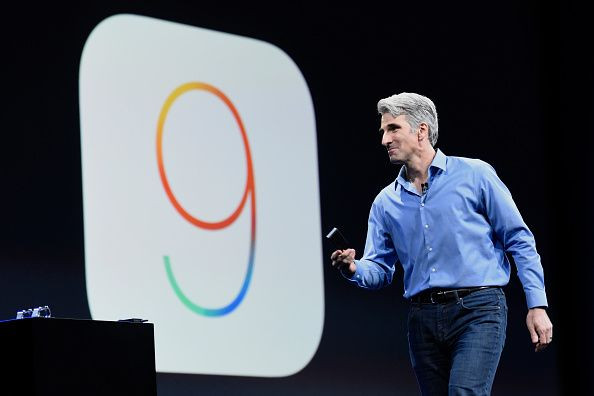Apple Gets Serious About Search With iOS 9 (Goodbye To Google On iPhone?)

If you blinked you might’ve missed it, but make no mistake: At its Worldwide Developer Conference last week, Apple announced a slew of new features in the upcoming iOS 9 mobile operating system that threaten to seriously erode Google’s mobile search revenue. The vast majority of the features originate on Apple platforms, according to one recent estimate.
By building a better, smarter search service around Spotlight and Siri, Apple may be able to keep iPhone users from defaulting to Google’s iOS app for search. That would be bad news for Larry Page and company – already struggling to gain momentum in mobile search as personal computing migrates away from the desktop. Goldman Sachs estimates that Google derived 75 percent of the $11.8 billion it made on mobile search ads in 2014 from searches from iPhone and iPad users.
Apple’s commitment to build a better, native search service on iOS 9 could also benefit another Google rival: Microsoft. Redmond’s Bing search engine provides results for Web searches made through Spotlight.
Apple spent all of one minute on the search announcement, which is nothing compared to the more than 40 minutes it dedicated to Apple Music, but in that 60 seconds it showed plans for turning its simple Spotlight search feature into a full-fledged search engine. Most notably, Apple is going to give developers a way to connect their apps with Spotlight, allowing iPhone users to search for information across the entirety of their phone’s contents.
“Now when a user performs a search, we can find content behind the apps they have installed on the device and pull those up in results,” said Craig Federighi, Apple's senior vice president of software engineering, during the WWDC keynote.
Google shows Android users information from some of their apps through Google Now, and it is capable of searching within about 1,000 Android apps, which is less than 1 percent of the more than 1 million apps available. The figure is even smaller for iPhone users since Google only began indexing iOS apps a few weeks ago.
Apple, meanwhile, has a strong track record when it comes to getting developers to adopt new features. When iOS 9 is released this fall, it’s a good bet many apps will support the Spotlight search engine out of the gate. “If you were Amazon, wouldn't you be absolutely burning to be connected to the home Spotlight page of every Apple user?” said Brook Shepard, general manager of Mason Interactive, a marketing agency.
If Spotlight turns into another success, many iPhone users might ditch Google and make Apple their primary search engine. “They're not losing any sleep over the fact that this hurts Google,” said Rob Enderle, president and principal analyst at the Enderle Group. “They're making it easy for users, which of course is important, but I think the reason they're funding it at this level is because they know it hurts Google.”
Apple said Spotlight on iOS 9 will be easily accessible to users (just swipe left from the home screen) and will deliver search results from a wide range of databases. Already the feature can be used to search for data within a user’s iPhone, such as an email or a note, but in iOS 9 Spotlight will be able to search for all kinds of content and show users all kinds of results, such as videos from YouTube or Vimeo as well as sports scores, without having to open a Web browser.
Additionally, Spotlight will offers users predictive results from the moment they open the search feature. These will include users’ frequent contacts, links to nearby shops and breaking news stories. With predictive results, Apple is taking a direct shot at Google Now, which is designed to give users information they need before they search for it.
“As Apple gets more aggressive with search, they're going to do it a little bit differently,” said Dave Ragals, global managing director of search for IgnitionOne, a digital marketing firm. “Baking it into iOS so that it's just a natural functionality of using your device is not something that necessarily makes you think of search. You just think of using your device.”
Apple took another swipe at Google at WWDC when it announced that all of the personal information Spotlight uses to deliver results are kept on users’ iPhones, not on Apple’s servers in the cloud where it could be mined or sold to third parties. Essentially, Apple is trying to bill Spotlight as the search engine for the privacy conscious, and respecting users’ privacy has always been one of Google’s major weaknesses considering its business is built on letting advertisers target you with tailored ads.
“We don't mine your email, your photos or your contacts in the cloud to learn things about you. We honestly just don't want to know,” Federighi said. “All of this is done on device, and it stays on device, under your control.”
In the future, Apple may change its tune and decide Spotlight is a perfect place to sell you ads, but for now, the company is doing a great job selling iPhones and has little incentive to anger its users by violating their privacy. That’s a big advantage over Google, and it could be just enough to turn many users into Spotlight search loyalists. “For Google, it’s a very big worrying signal for them that Apple understands the value of search and wants to put it at the center of their user experience,” said Vince Meyer, adMarketplace’s vice president of business development.
© Copyright IBTimes 2024. All rights reserved.






















